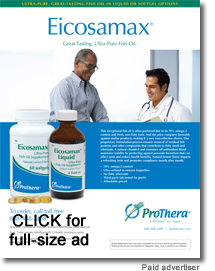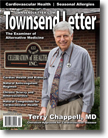Page 1, 2
First, when a drug really works to suppress or counteract the target symptom or abnormality, the condition is likely to reappear with equal or greater intensity as soon as the drug wears off. Using chemicals in this fashion, to force the issue rather than simply to assist whatever self-healing processes are already under way, cannot fail to pose the major risk of needing to continue using them for long periods of time, if not indefinitely, and thus transforming what is often an idiomatic episode in the patient's life into an ongoing if not permanent chronic illness with the power to propagate itself through time.
Second, narrowly targeting drug treatment to specific chemical abnormalities and abstract pathological "entities" without rebalancing the energy dysfunction of the patient as an integrated whole naturally and inevitably leads to polypharmacy, the need for still other drugs to correct or control whatever other diseases and abnormalities we are able to identify in the future.
Last but not least, drugs powerful enough to do what we expect them to do are also capable of acting coercively on various other physiological functions, although these usually undesirable "side effects" may vary quite a lot, according to each patient's unique tendencies and predispositions, and will therefore be rather more difficult to attribute unequivocally to the action of the drug.
The ubiquity and relative invisibility of such adverse reactions make it a lot easier to understand why homeopathy has become so popular with patients caught in the tentacles of the medical system on the one hand, yet so easily dismissed by those who administer that system as ineffective, impossible, or unworthy of serious study on the other. In pointed contrast to allopathic drugs, which are developed solely for their power to force the organism to do what it has no natural inclination to do, homeopathy seeks rather to assist and even enhance the innate self-healing capacity that is synonymous with life, continually at work in every patient, and encompasses precisely those same individualizing tendencies, sensitivities, and predispositions that, as physicians, we are expected to ignore in our diagnoses, outperform in our research, and override in our treatment.
That is also the reason why, even when homeopathic remedies do act curatively, the results are simply dismissed or written off as isolated cases, perhaps "miraculous" at times, but in any case merely "anecdotal evidence" without scientific import, and therefore always located on the placebo side of the ledger. Medical science as presently constituted restricts the term "cause" to those interventions that force things to happen and measures that power against the idiomatic and somewhat unpredictable tendency of every individual patient to recover without it.
 Even in the case of well-designed RCT's that demonstrate a statistically significant benefit from homeopathic treatment, the result still "feels" unscientific and unpersuasive to most people, simply because no such chemical force had to be exerted and no such resistance overcome. To trained scientists, homeopathy’s looser interpretation of causality and its emphasis on subjective and individual variables both disqualify it from serious consideration as a force potent, measurable, and consistent enough to count as "hard science." Even in the case of well-designed RCT's that demonstrate a statistically significant benefit from homeopathic treatment, the result still "feels" unscientific and unpersuasive to most people, simply because no such chemical force had to be exerted and no such resistance overcome. To trained scientists, homeopathy’s looser interpretation of causality and its emphasis on subjective and individual variables both disqualify it from serious consideration as a force potent, measurable, and consistent enough to count as "hard science."
So, the standard argument that homeopathic remedies are merely placebos actually cuts both ways. In the first place, it's simply wrong. In addition to all of the evidence I have already presented, I can attest from my own experience that homeopathic treatment has an impressive track record in the treatment of animals, newborn babies, and patients in coma, in whom the possibility of suggestion is clearly remote. Secondly, if giving placebo, natural remedies, or nothing at all can achieve clinical results equivalent or even comparable to those obtainable with suppressive drugs or crippling surgery, who of sound mind would not prefer the cheaper, gentler, and safer alternative, at least to begin with?
Finally, and perhaps best of all, when homeopathic remedies do act curatively, our patients rightly feel that they have healed themselves and may sometimes wonder if they might have done so without our help. To my mind, that "delicious quandary" is hardly a cause for complaint, much less ridicule, since I can imagine no higher compliment to pay to a medicine than that its action cannot be readily distinguished from a gentle, spontaneous, and long-lasting cure requiring no further treatment.
Indeed, as I see it, the irony lies wholly on the other side, that this optimal response is relegated to the placebo half of the equation while pharmaceutical drugs are valued and considered effective only to the extent that they can overpower the physiology of as many patients and for as long a time as possible. I find it absurd and contemptible to boast of standards that prize brute force over elegance of fit, and that subordinate healing the sick to manipulating life functions artificially in the name of science, ambition, mastery over nature, or some equally abstract, hypothetical goal that we are obliged to take on faith.
That is why, for the present at least, I am thankful that our cures tend to remain snugly ensconced on the placebo side of things because until we develop a kinder, more accurate, and inclusive model of causality, and a workable notion of the unified life energy of the patient as a whole, that is precisely where they belong. What the nuclear physicist J. R. Oppenheimer once told a group of psychologists thus seems even more apposite for the medical community as a whole:
We inherited at the beginning of the Twentieth Century a notion of the physical world as a causal one, in which every event could be accounted for if we were ingenious, a world characterized by number, where everything interesting could be measured, and anything that went on could be broken down and analyzed. This extremely rigid picture left out a great deal of common sense which we can now understand with a complete lack of ambiguity and phenomenal technical success. One [such idea] is that the world is not completely determinate. There are technical predictions you can make about it, but they are purely statistical. Every event has in it the nature of a surprise, a miracle, or something you could not figure out. Every pair of observations taking the form "we know this and can predict that" is global and cannot be broken down. Every atomic event is individual: it is not in its essentials reproducible.14
For all of these reasons, instead of competing with the placebo effect in order to defeat it, I have come to believe that the highest goal of medicinal treatment, whether homeopathic or otherwise, is precisely to assist and even to maximize it by doing everything to promote healing in its most global sense, not just correct abnormalities, and by cultivating a deeper and more thorough knowledge of our patients, not ignoring, circumventing, or overriding what they have to teach us. To that end, while admiring the ingenuity and dedication of my colleagues who design and conduct RCT's to demonstrate the effectiveness of homeopathic treatment in the usual way, I offer an alternative model for clinical research, based on the inescapable bottom line of self-healing, which is equally applicable to allopathic medicine as well:
1) Nobody is blinded: all subjects know whether they are receiving homeopathic or allopathic treatment, having chosen it beforehand precisely because of their interest, belief, or faith in it.
2) Nobody gets placebo: everyone gets the treatment they select, while the doctors giving it out are matched to them by their beliefs, and encouraged to use prayer, suggestion, exhortation, shamanic incantation, or whatever they or their subjects believe will most effectively assist them on their healing path. In other words, each group will serve as the control of the other.
3) Using the totality of signs and symptoms over time, including both subjective and objective criteria, and reports of family, friends, teachers, employers, etc., both homeopathic and allopathic subjects will be followed for a period of months or years, depending on the condition, and extending beyond the acute phase to include the chronic dimension. Both groups will then be evaluated as to how well or badly they are measuring up in their own lives, by their own standards and those of their community, and also with respect to appropriate clinical and pathological criteria.
4) Qualified judges not exclusively or doctrinally committed to either point of view will then ascertain which form of treatment proves more beneficial in which respects, and will publish the results in a friendly, fair, and unbiased journal of good repute, to be selected and agreed upon in advance.15
For myself and my colleagues, homeopathy has stood the test of time as a philosophy, a coherent, logical system of thought, derived from the self-evident unity of the life force, a simple truism, and the "Law of Similars," a bold postulate, neither of which follows logically from anything else, or is therefore subject to experimental proof or disproof, like ordinary scientific hypotheses, as in Bertrand Russell's whimsical definition:
. . . the point of philosophy is to start with something so obvious as not to seem
worth stating, and to end with something so paradoxical that no one will believe it.16
I freely admit, as I think even Dr. Smith would heartily agree, that homeopathy fits this description perfectly. Yet, the authenticity of the homeopathic phenomenon, the enduring relevance of the point of view it offers, and the obvious effectiveness of minute doses when competently used all imply the existence of a bioenergetic science that is still in its infancy, and will undoubtedly add to the atomic theory of matter and the laws of chemistry, bringing a further set of rules, laws, hypotheses, and predictions as it develops in the future, just as Dr. Smith has foretold. In that sense, homeopathy also looks beyond itself to a more open and inclusive conceptual scheme that can accommodate both points of view, as well as perhaps others as yet unknown to us. Helping to envision, identify, and elaborate this new synthesis thus becomes our highest mission, which we share with like-minded physicians and healers of all persuasions and in every part of the world.
Page 1, 2
References .pdf |
![]()
![]()
![]()
![]()






